THE GCSE YEARS
2023-2025



THE GCSE YEARS
2023-2025


Welcome to the Kingswood GCSE Curriculum Booklet in which heads of the academic departments explain what you can expect to be doing in each subject offered at GCSE.
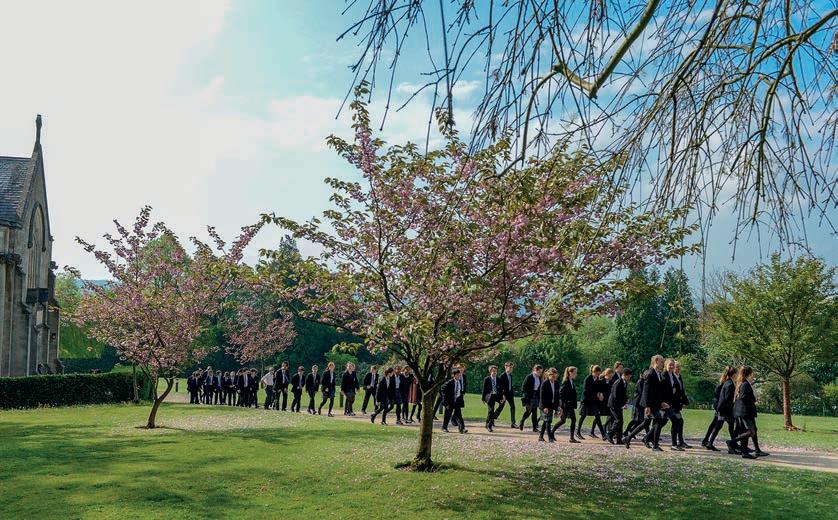
Although you will all be following the core curriculum – outlined on page 2 – you will also be expected to choose three more subjects from the option lines offered. You have some important decisions to make! We have put together a timetable for the Spring Term (page 2) which will give you plenty of opportunities to discuss possible choices with a number of staff.
This really is the first time you have been able to shape your own curriculum in a significant way. Read this booklet carefully. Use your family, your teachers and your friends as sounding boards for your initial ideas. It is important, though, not to choose an option subject solely because that is what all your friends will be studying. You should have a genuine interest in your option choices.
As you make your choices, you should bear in mind the following considerations:
• your own interests, talents and enjoyment
• your realistic chance of success in any given subject
• your future requirements, if you know them at this stage. Detailed career decisions are unlikely to be appropriate at the moment, but it is important to know which doors may be closed by decisions made now
Remember that you will be spending two years focusing on your GCSE courses and so it’s important to be positive and fully committed from the outset.
You will continue with Games and PE. You will also be expected to participate fully in the Senior Activities programme. Make your choices carefully here too, basing them on your enthusiasms and your talents. Your contributions and commitment to Activities will be as important to your personal development as your curricular subjects.
We hope that you will find the responsibility of thinking about and shaping the next stage of your academic career stimulating and enjoyable.
12 January 2023 GCSE subject choices options event (online) Online GCSE booklet and options form link sent to parents and pupils, for initial discussions
18 January 2023 Year 9 Parents’ Meeting
10 February 2023 Online GCSE options forms completed by 4.30pm (Earlier returns will be accepted.)
CORE:
In Year 10, pupils take courses in Mathematics, English, English Literature, Biology, Chemistry and Physics, and a core Modern Language (French or German or Spanish) or English as another Language. General RPE (if not taking RPE as an option), PE, Games, Life Skills and Activities are also mandatory.
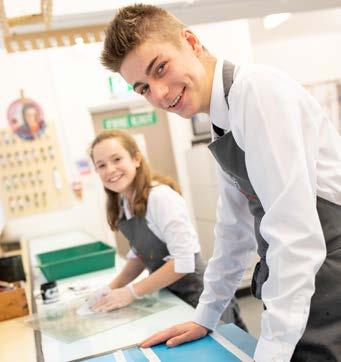
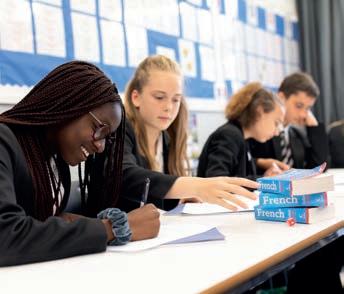
OPTIONS:
You can choose your three options (in order of preference) from the subject list below. Of course, we cannot guarantee that each student will end up with their preferred combination but will try to ensure that everyone is satisfied. We will confirm that you have your choices early on in the Summer term. (All options courses are offered subject to demand)
• Art
• Computer Science
• Design Technology
• Drama
• French*
• Geography
• German*
• History
• Latin
• Mandarin
• Music
• Physical Education
• Spanish*
• RPE (Religion, Philosophy & Ethics
(If you wish to take another language as well as your core MFL*)
Setting in English is in broad ability bands, usually with two equal classes for 'upper', 'middle' and 'lower' ability. Usually, the majority of pupils study both English and English Literature in Year 10. We endeavour to ensure that each student is placed in a group where they will be stimulated and inspired, as well as prepared for their examinations. If it is deemed appropriate, some pupils may be advised to enter the English examination only, in order to give them a better chance of doing well in this important qualification.
There is no setting involved for pupils learning Latin, or a modern foreign language in an Option line, as there is only one class of each. The compulsory Year 10 classes in French, German and Spanish are organised into sets based on academic performance in Year 9. These sets are reviewed on a termly basis.
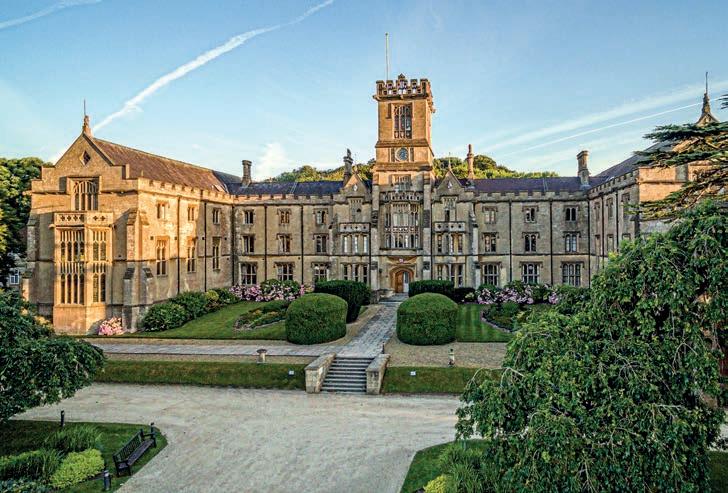
Like English, Science is organised into three broad bands based on ability in science. One or both of the classes in the lower band will pursue Double Award (two IGCSEs) whereas the 'middle' and 'upper' bands pursue the Separate Award (three IGCSEs). There is more information on this in the science section of this booklet.
In every year group sets are adjusted annually to take into account both pupil progress and the intake of new pupils. Sets are well established by the beginning of Year 10. Usually pupils new to the year group are set according to their entrance examination and are monitored very closely during that first term to ensure that their setting arrangements are appropriate. All groups sit the same topic tests to allow for ease of comparison, and departmental staff discuss setting arrangements regularly as a part of their departmental meetings. Therefore there are opportunities for pupils to move when it is deemed appropriate.
Although the 9 to 1 grading system for GCSE-level qualifications is now well-established, it might still be helpful for parents to have the approximate equivalent grades on the A* - G tariff for reference.
The approximate equivalences are in the diagram below. It is likely that government policy will shift slightly over the coming years. For up-to-date information, please refer to the Department for Education’s website.
As an Independent School, Kingswood may choose to use IGCSE rather than GCSE specifications. We intend to enter our 2023-25 GCSE cohort for IGCSE examinations in Biology, Chemistry, Physics, English, Mathematics and RPE. Our independence enables us to continue choosing the best qualifications for our pupils.


Conclusive recent research into the comparative challenge level of IGCSEs and GCSEs has shown that the qualifications are equivalent, and are certainly recognised as such by all the best universities, both in the UK and elsewhere. It remains the policy of Kingswood School to use the qualifications that we think have most educational merit for our pupils.
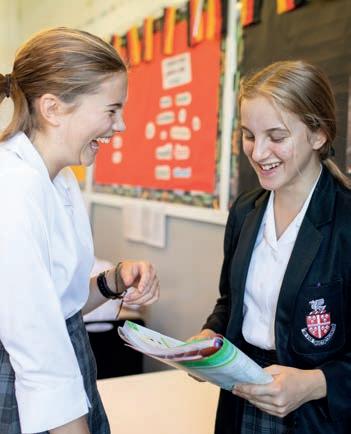
You will improve your writing, reading, speaking, and listening skills.
You will be able to develop your ideas fully in writing, using a variety of formats. In discussions, you will be able to develop ideas, present your views formally and take on role-play, as appropriate.
You will learn how to read literary texts, including Shakespeare, drama, poetry and contemporary prose; and develop the ability to analyse and write informed personal responses.
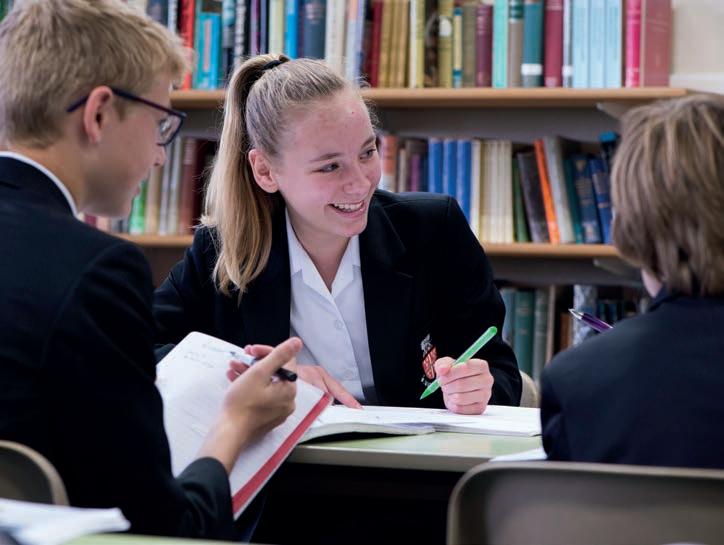
Whilst English Language and English Literature are certificated through two separate IGCSEs, you will be taught both subjects through a combined approach. You will be exposed to some of the best writing, theorising, philosophising and thinking that has happened in the history of civilisation; you will learn the power of language; you will discover the way in which art holds a mirror up to nature.
Everyone in the School is required to study English. We expect that you will be able to write coherently and lucidly in Standard English with few grammatical errors. You should also be able to read and enjoy challenging fiction, drama, poetry and non-fiction with understanding and sensitivity.
In English Language, we study the Cambridge IGCSE. You will prepare for one two hour written examination (50%) and will write a portfolio of three coursework pieces (50%).
The examination involves reading two related texts and completing a series of short answer questions, longer more detailed questions and a non-fiction writing task.
The coursework pieces give you the opportunity to hone their creative writing skills in fiction and nonfiction genres. The pieces are narrative, descriptive and responsive. You will read many interesting, diverse and stimulating texts and then have the chance to draft and redraft your pieces to create the best writing you possibly can.
In English Literature, we study the Cambridge IGCSE. You will prepare for two written examinations (75%) and will write two coursework essays (25%).
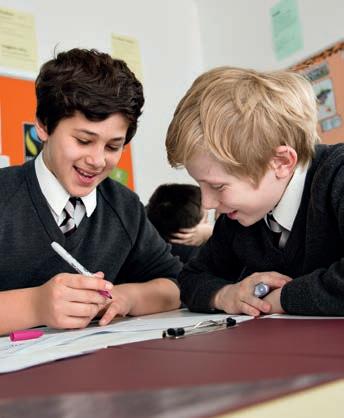
You will study a prose text, a drama text and a range of poetry. You will do this through class discussion, essay writing, contextual work and more creative exploration.
The reading, writing and communication skills you develop in GCSE English and English Literature will be useful for any subject you choose in the Sixth Form.
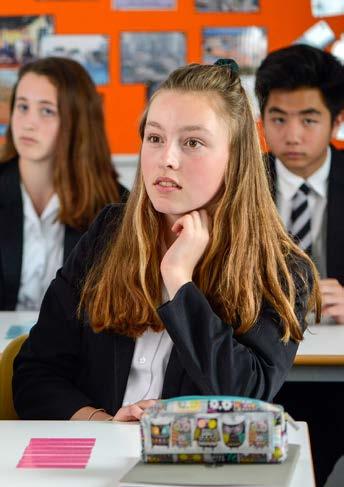

It is worth remembering that English GCSE is still one of the few matriculation qualifications for most British universities. If you do not have GCSE English at grade 5, or possibly even grade 6, you may not be eligible to study certain courses at University.
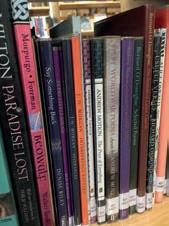
Mathematics is a subject which trains you to think creatively and logically, as well as work accurately and efficiently to reach irrefutable solutions to problems in all parts of life.
Throughout the course, you will develop analytical skills and learn to solve complex problems by breaking them down into smaller steps. You will develop the ability to accurately model and interpret results and to communicate your conclusions clearly and succinctly. You will become proficient in written and mental numerical calculations, handling and interpreting data and in the language of algebra. You will be given the opportunity to master all the tools required to take Mathematics to A Level and apply to real world concepts and situations.
A secure grasp of the course content found within the Key Stage 3 National Curriculum.
IGCSE Mathematics is assessed in the summer of Year 11 across two examinations. Both examinations allow the use of calculators and are two hours in duration. Both examinations carry equal weighting and are of equal difficulty; any content from the course could be tested in either paper. Half of the questions are fluency based, which students should recognise quickly. The other half are reasoning and problem solving questions that require deeper thinking and skills, as taught throughout the course. Almost all Kingswood students sit for the Higher tier (grades 9-3) in summer of Year 11, though there is a Foundation
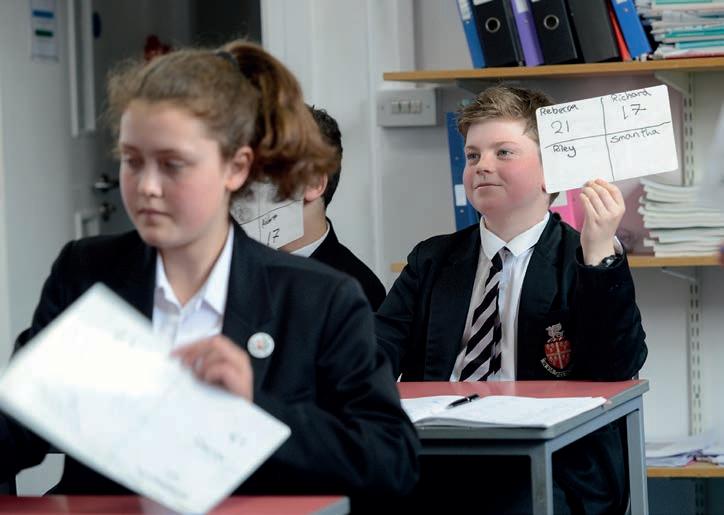
tier (grades 5-1) that we consider for some students; we have specific discussions with those students and their families about the Foundation tier if appropriate.
All pupils are required to bring the necessary equipment to lessons, this includes a scientific calculator. We recommend that students each have either the Casio FX83GTX or the more powerful Casio FX991EX Classwiz of their own for every lesson. Please note the latter of these calculators while being suitable for use at IGCSE is essential for A Level Mathematics study.
Mathematics is extremely sought after post Key Stage 4. The interpretative skills will be most useful for A Level courses which involve a numerate element, such as Economics, Psychology, Physical Education, Geography, or any of the Sciences. It is, of course, a prerequisite for Mathematics and Further Mathematics.
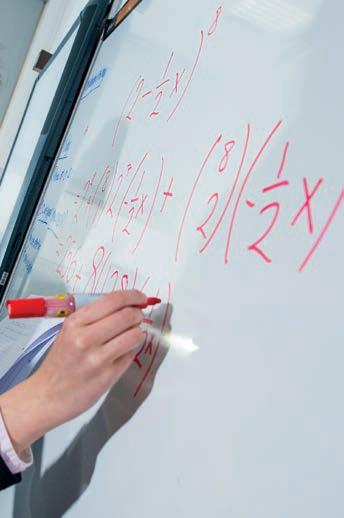
Please note: Kingswood entry requirements for A Level Mathematics state that pupils will only be considered for the course if they have studied Mathematics at Higher Tier GCSE (or IGCSE) and have attained a grade 7, 8 or 9. For A Level Further Mathematics, a grade 8 or 9 is required to be accepted onto the course.
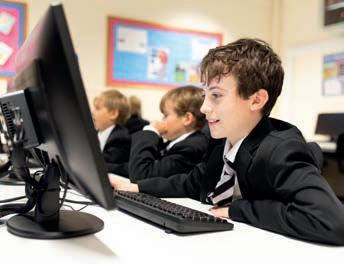
It is worth remembering that grade 4 in Mathematics GCSE (or IGCSE) is a requirement for matriculation onto most courses at most British universities. An increasing number of university courses are now setting their minimum grade for matriculation at grade 5.
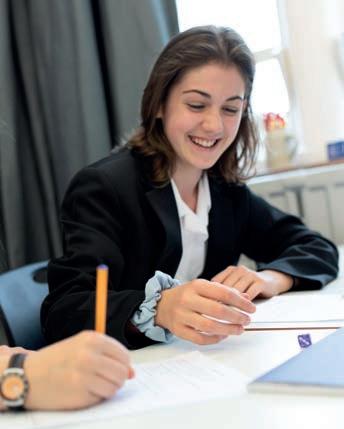
The main areas of the specification for Science include content from Biology, Chemistry and Physics and cover all aspects of a good science education, with particular emphasis on evaluating evidence and the implications of science for society. The Year 10 and Year 11 courses follow on from the work covered in Year 9.
During the course, pupils will be able to apply their knowledge with understanding to scientific examples from domestic, industrial and environmental contexts and there will be opportunities for pupils to use key skills to organise and present information clearly and logically using a variety of techniques, including the use of ICT.
All pupils must continue these courses as a minimum science requirement at Kingswood School. The courses continue to develop the ideas taught in Year 9, both in terms of content and practical skills.
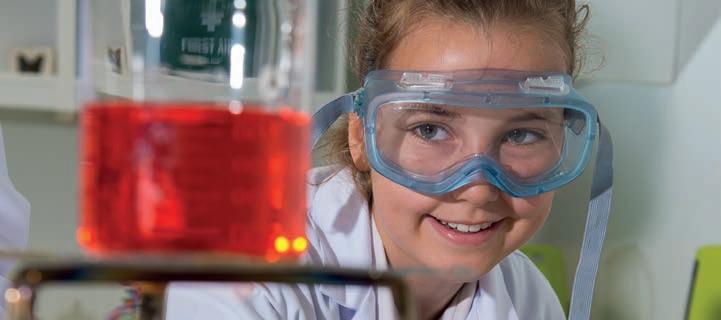
All pupils follow the IGCSE courses for Biology, Chemistry and Physics in Years 9, 10 and 11. Setting takes place at the end of Year 9 in preparation for Year 10. Pupils are taught in Science classes which are setted in three bands, with the classes in each band being of equal ability. Differentiation in teaching occurs across the bands in order to allow all pupils to fulfil their potential.
Nature and Variety of Living Things
Structure and Function in Living Things
Reproduction and Inheritance
Ecology and Environment
Use of Biological Resources
Principles of Chemistry
Inorganic Chemistry
Physical Chemistry
Organic Chemistry
Forces and Motion
Electricity
Waves
Energy Resources and Energy Transfer
Solids, Liquids and Gases
Magnetism and Electromagnetism
Radioactivity and Particles
Astrophysics
Pupil progress across all three Sciences is closely tracked. Based on the results of topic tests taken in the first term of Year 10 in all three Sciences, the decision about entry for Separate or Double Award will be made in February and any necessary movement between bands will occur. The top two bands will continue to study material for three separate IGCSEs. Pupils in the lowest band are taught material for the Double Award IGCSE Science examinations only from February half term in Year 10 in order to give them the best chance to obtain good GCSE grades.
For those completing the Separate Science route the final examinations are made up from two papers for each Science. The first paper is 2 hours in duration, made up of 110 marks and worth 66.7% of the total marks. The second paper is 1.25 hours in duration, made up of 70 marks and worth 33.3% of the marks. For those completing the Double Award there are three 2 hour papers assessing Biology, Chemistry and Physics.
The examination papers for all courses are no longer tiered at Higher or Foundation level. Instead, the examination papers become harder as the pupil progresses through the paper. The style of the questions vary from short responses for 1 or 2 marks to longer responses for up to 8 marks. All candidates will be encouraged to complete the whole paper to the best of their ability.
There is no coursework in this specification but investigative techniques are assessed in the theory papers, so a good background in practical work is provided throughout the course as part of normal lesson activities.
The sciences support many other subjects at A Level and obviously go together very well.
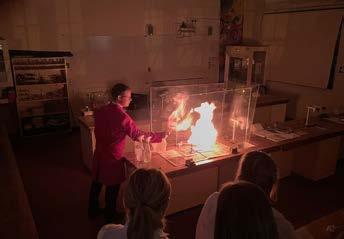
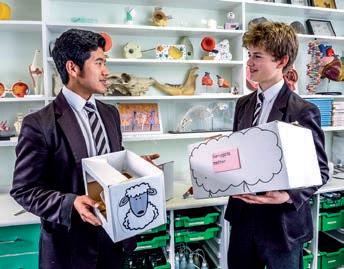
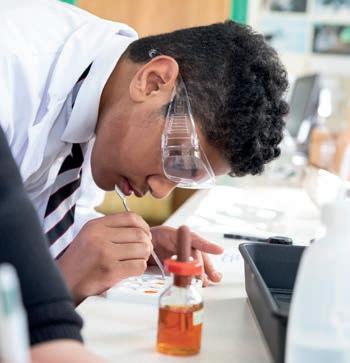
Biology overlaps with some areas of Geography and Sports Science and is highly recommended for those planning on pursuing medical and veterinary courses at university; Chemistry is essential for medicine and veterinary courses as well as leading to courses such as pharmacy, pharmacology and chemical engineering. Physics has a mutualistic association with Mathematics at A Level and is an essential element for a career in Engineering. The application of Physics concepts is also important in Design Technology.
Further information about the Separate Science courses can be found on the Edexcel examination board website at www.edexcel.org.uk
Should you wish to study two languages at GCSE, one of these will be an option and the other your core. Please circle your first language choice in the core section of the options form, then tick your second language option in the main part of the sheet.
It is important to have displayed a good understanding of the grammar covered in Years 7, 8 and 9. You should continue learning Spanish, French or German if you enjoy the language and are motivated to deepen your understanding of the subject. If you are culturally curious you will gain much from the course. You should enjoy communicating and will gain greater confidence to articulate your ideas in the target language. Linguistic flair will be advantageous, but a disciplined approach to learning vocabulary and new grammatical structures is also a prerequisite for success.
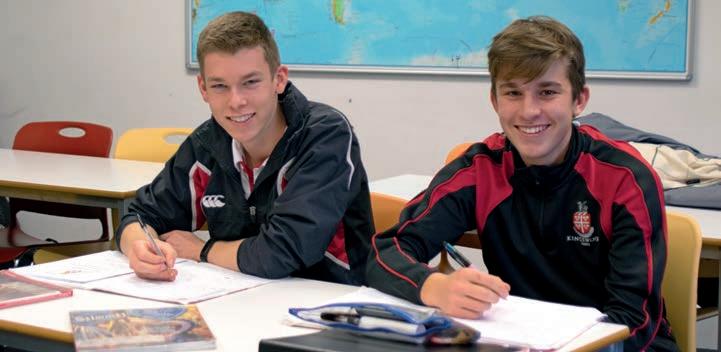
Following the UK’s withdrawal from the EU, it is even more important for people in the UK to be able to communicate in another language. Knowledge of a foreign language is key to understanding how people think and not only plays a major role in social cohesion but also provides a skill for life. There are currently over 600 million speakers of either Spanish, French or German as a first language in the world. Spanish is the second most widely spoken language in the world after English, French is an official working language of the UN, the International Red Cross, and German is the language of the world's third most powerful economy and the most powerful in Europe.
The European Economic Community, NATO, and the International Olympic Committee and German remains the UK’s most important European trade partner. Being able to communicate effectively in one or more of these languages is a portable skill that will open up opportunities in your future professional lives, as well as offering you greater freedom to travel and to forge social contacts with people across Europe and the World.
You will acquire the ability to read and respond to texts in the target language, as well as listening to native
speakers. You will learn to use a range of vocabulary and structures, whilst developing your knowledge and understanding of grammar; this will be tested to some extent through the medium of translation. You will have the opportunity to apply your knowledge through role-play, research on cultural aspects including film, literature, and ICT work. You will gain cultural awareness of countries and communities where the target language is spoken. You will be able to give your opinion on a range of topics. You will learn to read and respond to different types of written language, including texts from ICT-based sources.
This insight into different cultures and ways of life will help you to foster a positive approach to other societies. Over the years we have had the opportunity to participate in an annual Exchange to either Madrid, Munster or Toulouse. We are hopeful that in the near future we can begin these excellent trips once again and we would strongly encourage pupils to consider these during the GCSE course as it can be invaluable in terms of confidence and fluency in the target language. There are also plans for further trips in the near future. These also gives pupils a ‘real’ experience of the target language country and allows them to put into practice what they have studied in the classroom. Pupils will also have the opportunity in Year 11 to have speaking sessions with our Language Assistants.
GCSE MFL examinations reflect young people’s interests and the topics should be of relevance to you. The course is designed to cover three themes divided into four sub-topics which are already familiar and relevant to you so that you will find it easier to comment on them in the language.
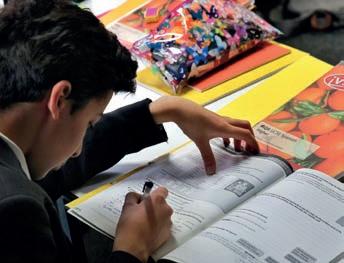
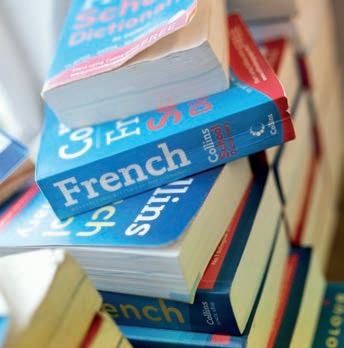
THEME 1: IDENTITY AND CULTURE
Topic 1: Me, My Family and Friends
Relationships with family and friends
Marriage / partnership
Topic 2: Technology in everyday life
Social media
Mobile technology
Topic 3: Free-time activities
Music
Cinema and TV
Food and eating out
Sport
Topic 4: Customs and Festivals in Spanish / French / German speaking countries and communities
THEME 2: LOCAL, NATIONAL, INTERNATIONAL AND GLOBAL AREAS OF INTEREST
Topic 1: Home, town, neighbourhood and region
Topic 2: Social issues
Charity / voluntary work
Healthy / unhealthy living
Topic 3: Global issues
The environment
Poverty / homelessness
Topic 4: Travel and tourism
THEME 3: CURRENT AND FUTURE STUDY AND EMPLOYMENT
Topic 1: My studies
Topic 2: Life at school / college
Topic 3: Education post-16
Topic 4: Jobs, career choices and ambitions
The GCSE course contains no coursework or controlled assessment. Assessment covers the four skills of reading, writing, listening and speaking. Each of these skills is tested in a separate examination. Each skill is worth 25% of the overall mark. The GCSE course offers pupils exposure to more transactional and useful language skills preparing our pupils for realistic scenarios on an exchange or in the workplace abroad.
The speaking element puts more emphasis on creativity, fluency and spontaneity. The speaking examination consists of three parts: the pupil has to develop a brief dialogue in the form of a role-play, respond to questions based on a photo, and the final part is a more general conversation based on two themes. Depending on the tier sat, this examination could last 7 - 9 minutes or 10 -12 minutes with 12 minutes of supervised preparation. This examination is conducted by the students’ MFL teacher. The listening and reading papers will require pupils to understand the target language, but to write the majority of their answers in English.
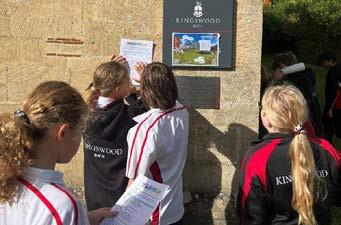
The written examination requires candidates to show their ability to write in the target language without a dictionary to help them. These three examinations last between 35 - 80 minutes. There is no possibility of a mixture of foundation tier or higher tier papers. Students have to do all four papers at the same level.
A GCSE in a MFL combines well with any other subject at A Level. Knowing a language will enable you to acquire other languages more easily in the future for business or leisure purposes. However, you should not assume that learning one is a skill that will only be of use for a career in languages. Many universities actively welcome a MFL at A Level for entry on courses involving science, engineering, medicine and business, as well as traditional Arts subjects.
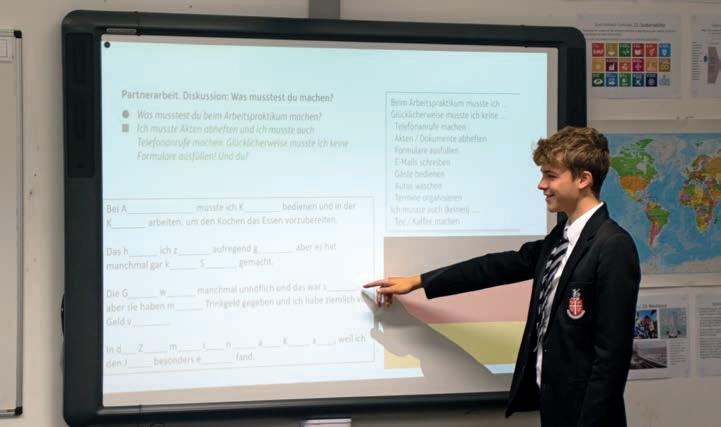
You will continue to be taught the five skills of reading, writing, use of English (grammar), listening, and speaking.
EAL provides valuable support to you in your other subjects at school by helping you to improve your confidence and proficiency in the language so that you are able to get the most from your studies at GCSE, especially English, and be in a good position to cope with the linguistic demands of subjects at A Level.
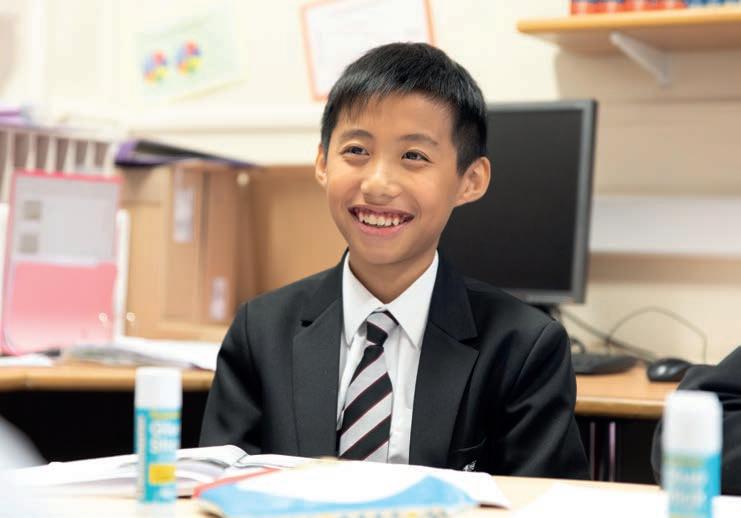
EAL is offered in Years 10 and 11 as the Modern Foreign Language for pupils whose mother tongue is not English and who have not taken French, German or Spanish in their first three years of secondary education. It is taught during those periods on the timetable when the rest of the year group is doing a modern European language. Pupils will take the Cambridge First Certificate in English (FCE) when they are in Year 10.
This certificate has widespread recognition in commerce and industry. It is taken by candidates throughout the world in about 100 countries and corresponds to level B2 of the Common European Framework for Reference of Languages. In Year 11, EAL pupils have the option to sit the Pearson IGCSE English as a Second Language examination if their English is not sufficient to be entered for the English Language GCSE.
You should already have reached an Intermediate
level of English. You should be able to express your own ideas orally and in writing with a reasonable degree of fluency. You should be able to read graded readers at CEFR level B2 without difficulty. You should also have an interest in and knowledge of Britain, its people, culture and way of life and a desire to know more, so that you are able to understand the social environment of your school and feel comfortable in it.
There is no actual coursework element in the FCE syllabus, but pupils are expected to maintain an ongoing private reading programme, using the extensive resources of the EAL library. Pupils are also expected to maintain a lexical notebook in which they write down the key terms they encounter, paying particular attention to collocation and lexical chunks.
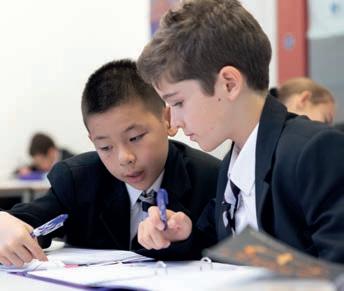
Topics covered include: entertainment, food, sport and leisure, technology, relationships, education, careers and employment, crime and punishment, the natural world, weather, holidays and travel, health, house
You will develop greater awareness of the nature of language and language-learning skills.
When writing, you will learn to identify, organise, structure and present material in an appropriate format and register for a particular audience or purpose. In preparation for the reading examination, you will learn how to recognise and understand ideas, opinions and attitudes within extended texts and explore the connections between them. You will also develop the ability to deduce the inferred meaning of more complex texts. You will also develop a range of listening skills which will prepare you to identify the important points or themes of a given listening activity, including attitude and relationships between speakers. Your speaking skills will develop sufficiently so that you can respond confidently to new, topical ideas and conduct a sustained conversation with a sense of audience and purpose.
and home, celebrations and customs, fashion, and shopping. Five skill areas are tested: reading, writing, use of English, listening, and speaking. The examination is divided into four papers and the total examination time is three and a half hours. A candidate’s overall FCE grade is based on the total score in all four papers. Grades awarded are A, B, C, D and E. Only A-C grades are passes.
You will have a level of English in which you can access the language that is used in mainstream classrooms. You should be able to express your own ideas orally and in writing with a quite high degree of fluency. You should be able to read graded readers at CEFR level B2 without difficulty.
The Pearson IGCSE ESL is an excellent preparation course for those pupils who need to gain an IELTS qualification in the Sixth Form to satisfy the English language entry requirements for a British University.
The full General Religion, Philosophy & Ethics (RPE) programme includes topics such as:
• The Meaning & Purpose of Life;
• Soul, Mind & Body;
• Life after Death;
• The Problem of Evil & Suffering;
• Medical Ethics: Euthanasia & Abortion;
• Social Justice;
• New Religious Movements;
• Approaches to Morality;
• The Ethics of Social Media;
• Traditional and Modern Spirituality;
• and Meditation & Mindfulness.
General RPE is a programme for all pupils not completing the IGCSE course in Religion, Philosophy & Ethics. Pupils will attend one timetabled lesson each week and have the opportunity to explore traditional and contemporary religious, spiritual, philosophical and ethical thinking in a non-examined format.
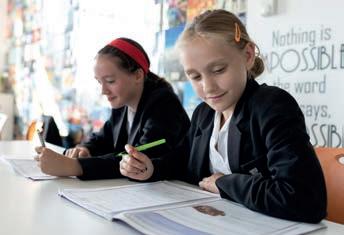
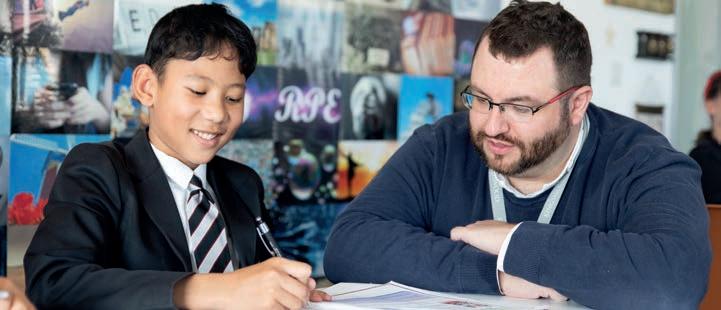
A breadth of religious and non-religious perspectives will be explored throughout the programme; pupils will be expected to participate in an objective and considerate manner. It is anticipated that General RPE will benefit students in a number of ways. These include:
• Cultivating empathy, the ability to understand people and take on board others’ views;
• Deconstructing and solving a range of complex problems;
• Developing research, analytical and presentational skills;
• Formulating questions effectively;
• Fostering the ability to work methodically and accurately;
• Honing the ability to interpret and synthesise information;
• Improving individual writing skills, accurate referencing and the construction of a reasoned argument;
• Refining the ability to understand the meaning of written sources;
• Sharpening the independence of mind and the ability to think critically.
This is a non-examined course for every pupil in Years 10 and 11, which follows on from the Life Skills curriculum at Key Stage 3 and prepares students for Sixth Form and adult life.
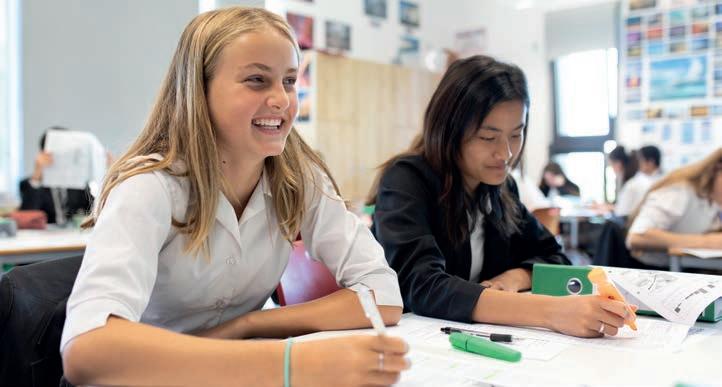
Life Skills lessons in Years 10 and 11 cover statutory content regarding relationships and health education, as well as also addressing important life skills through upto-date information and focused experienced teaching to enable you to go on to lead a healthy, fulfilling and happy adulthood.
There are several aims. It is hoped that you will:
• broaden your awareness of yourself;
• have a growing awareness of how your relationships with friends and family change as you get older;
• strengthen your financial awareness and understanding;
• understand more about how to research possible careers in the future;
• improve your study skills and preparation for examinations;
• consider your rights and responsibilities as a member of society;
• have a deeper understanding of how government works, whether local or national;
• learn about how our legal system works, and the role of the courts and police;
• understand something of how business, finance and the national economy operate;
• be informed about responsible sexual behaviour and the problems associated with the use of drugs.
Through completing this course you will increase your understanding of a range of different topics including:
• Healthy and unhealthy relationships
• Mental and physical health
• Contraception and sexual health
• Personal safety and first aid
• Online safety and social media
• Careers
• Drugs and alcohol
• Diversity and inclusion
• Personal finance
• The British political system
• The British legal system
GAMES AND PE ARE MANDATORY AND THE USUAL TERMLY OPTIONS WILL BE AVAILABLE TO PUPILS.
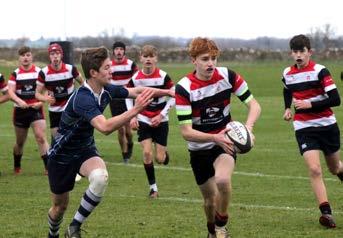
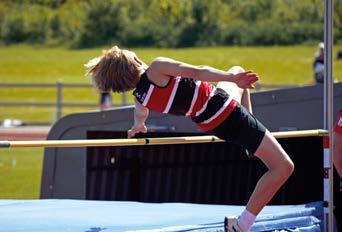
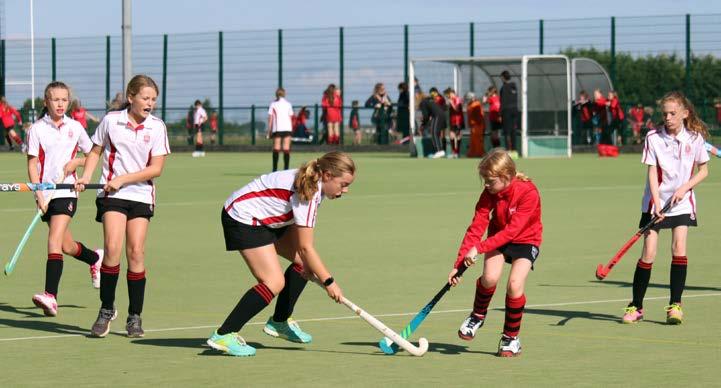
You can choose your three options (in order of preference) from the subjects listed on the following pages. Of course, we cannot guarantee that each student will end up with their preferred combination but will try to ensure that everyone is satisfied. We will confirm that you have your choices early on in the Summer term.
(All options courses are offered subject to demand.)
You will learn to visually record by:
• a range of approaches and media of observations, experiences and ideas from a primary stimulus;
• employing visual elements such as line, tone, colour, form, compositional organisation, structure and scale;
• experimenting with practical ideas in ways to support the development of your final pieces;
• relating processes and media to develop your own area of study.
You will learn to understand contexts in Art, Craft and Design by:
• integrating into your own practical work the knowledge and understanding of visual language gained from analysis and evaluation of images, objects and artefacts and their contexts, including some first hand experience of original work.

You will learn to practically develop by:
• developing and exploring ideas using a wide range of media, processes and resources in two and three dimensions including, where appropriate, ICT;
• reviewing, modifying and refining work as it progresses, including recognising and rectifying technical problems;
• experimenting with paint, drawing, printmaking, casting, carving and construction.
You will learn to realise your intentions by:
• presenting a personal response (final piece / conclusion) which demonstrates the realisation of intentions.
As a creative subject, a willingness to explore ideas and to experiment with a wide range of different media is very important. Good observational drawing skills and a developing understanding of painting is also very helpful. You should be prepared to discuss your work and enjoy the process of presenting a sketchbook. Regular visits to galleries for information and inspiration is beneficial.
The purpose of coursework, which makes up 60% of the overall mark, is to provide you with an opportunity to demonstrate achievement through response to set requirements. You will use knowledge and understanding through a range of approaches and applications in the ‘Fine Art’ area of study, using independent judgements that extend your thinking and development of practical skills. Coursework is completed over four terms and the Portfolio must include ‘a sustained project’ and ‘a selection of further work’.
The course involves some visits and workshops, for which a small charge may be made.
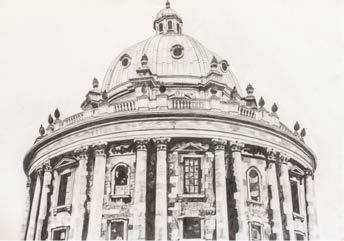
The course is structured to provide pupils with the opportunity to:
• actively engage in the process of making and understanding art and design;

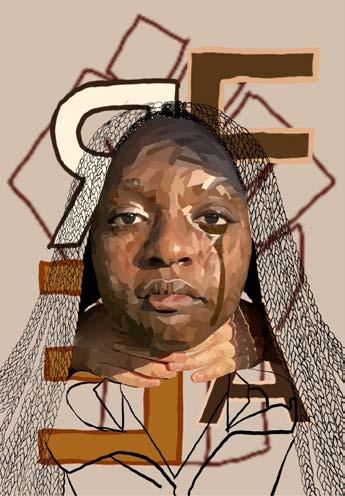
• develop creative skills through learning, imagination, exploring and experimenting; develop critical understanding.
The portfolio should include work that shows exploration, research, acquisition of techniques and skills towards a personal outcome(s).
The practical examination or ‘Externally Set Assignment’ at the start of the Summer term in Year 11, takes 10 hours of unaided focused study under supervision, usually over two days. However, the early release paper on 2 January gives pupils ample time to prepare for the examination and develop thorough responses. This work should not be underestimated and should contribute significantly to the awarding of the remaining 40% of the marks.
Both coursework and the examination are marked internally, and then moderated at the Centre by a moderator appointed by the examination board.
Gaining a 9-6 grade at GCSE will allow you take the subject at A Level.
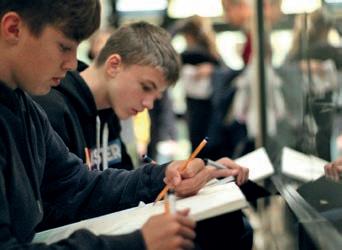
Computer Science GCSE will get you ready for the modern, digital world. It’s an exciting, creative subject that you can apply to almost any issue that you care about, from supporting people’s mental health, to finding sporting opportunities.
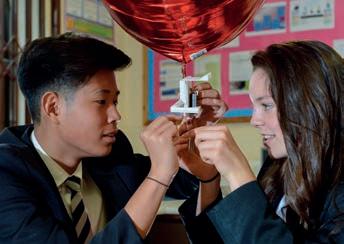
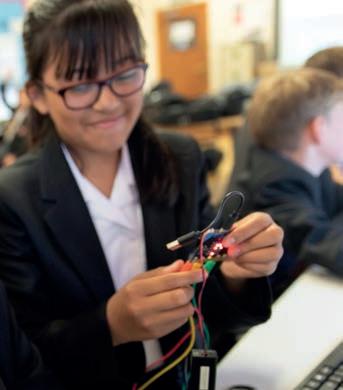
Studying Computer Science GCSE will develop your computational thinking which is the ability to think about any problem in a logical way, compare it to previous experiences and develop the solution.
As part of the Computer Science GCSE, you will:
• Experience programming and making new software
• Find out how hackers attack computers
• Discover how computers work
• Apply what you’ve learn to solve problems
Two exams, each worth 50%.
Component 1: Computer Systems
Component 2: Computational thinking, algorithms and programming
Almost every career in the future will have an element of computing involved. Technology is moving so fast that Computer Science knowledge will become an essential part of general knowledge and will help you pursue your chosen career for almost any area of work.
You might work in film, finance, the NHS, journalism, manufacturing, music or security. You could design the next big app, work with climate scientists to predict the environmental impacts of deforestation or work on the most effective ways to get medicine to where it’s needed.
If you enjoy working with others, being creative, working through challenges to get to a solution and the idea of making a positive difference in the world, then Computer Science could be for you.
This course is designed to encourage pupils to develop an awareness of the nature and significant importance of Design and Technology in a rapidly changing society. Pupils learn to combine practical skills with an understanding of aesthetic, social and environment issues, as well as function and industrial practices, all of which are essential in the technological field.
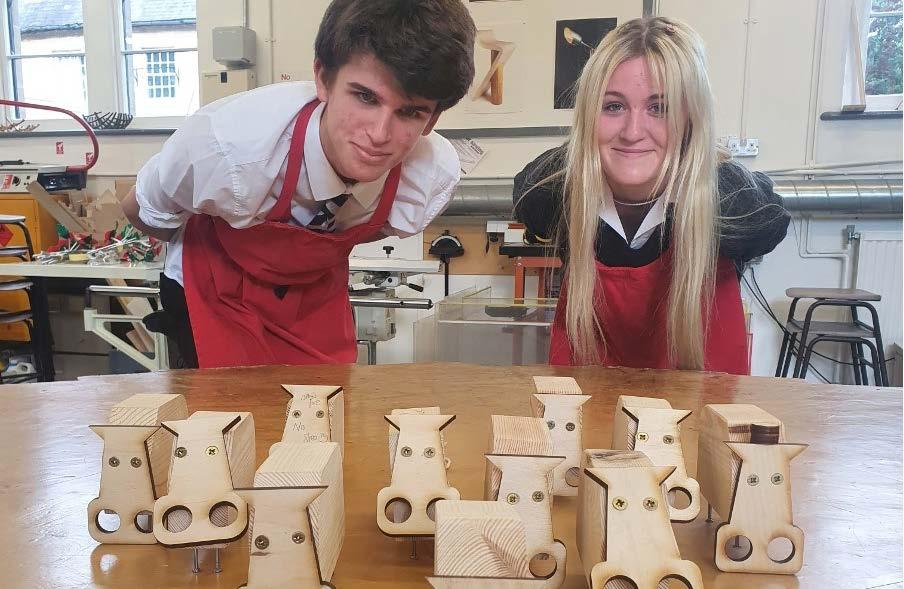
Students will become autonomous problem solvers as individuals and work as members of a team. The qualification equips students to study for an Advanced Level qualification in Design and Technology. This course will foster a love of creative thinking and broaden the understanding of materials' properties and their uses in the manufacturing world.
Candidates who are taking courses leading to this qualification will have followed the corresponding Key Stage 3 programme of study within the National Curriculum or will have studied the subject in Year 9 at Kingswood. The GCSE curriculum suits students with a good grasp of mathematics, creative thinkers, problem-solvers and those who are good practically. The ability to work independently on coursework and to meet deadlines is essential for success with the non-examined assessment.
THERE ARE 2 COMPONENTS.
Component 1: Written Paper 2 hours - 100 marks - 50% This is a theory examination which will test the candidates’ understanding of core principles in Design and Technology as a whole and will also test the specialist knowledge of timber materials. This is mainly covered in
Year 10 and demands theory lessons alongside practical skills building projects and examination preparation. A trip to the Design Museum will aid understanding of design history and product analysis.
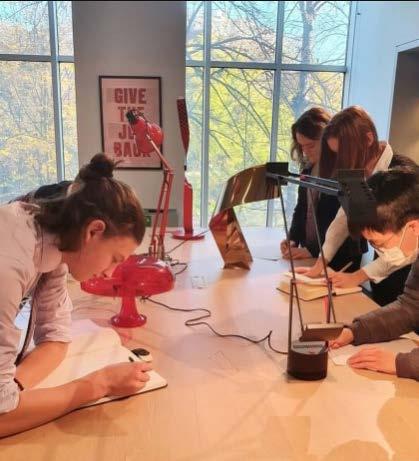
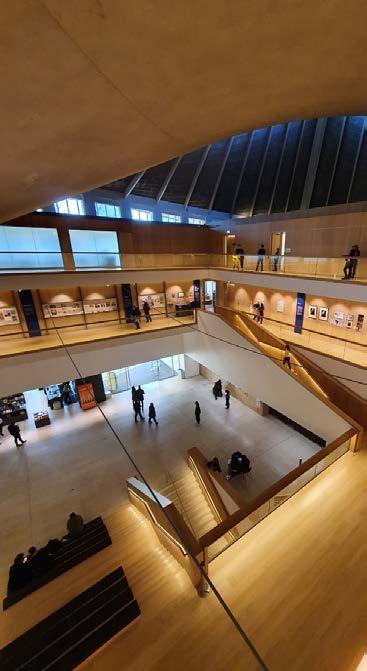
Component 2: Non-exam assessment (NEA) Design and Making Practice approximately 30-35 hours - 100 marks - 50% of the total GCSE marks in a practical design and make activity.
This assessment consists of a single design and make activity and will involve candidates researching, designing and subsequently modelling a functional prototype. Candidates will select a theme from a range of tasks set by the Board in the Summer term of Year 10 and submitted in February of Year 11; it is marked internally and then moderated externally. This is a large undertaking for pupils and demands significant effort, and may require some extra time to complete their projects in after school sessions.
Design and Technology provides links with STEM activities as well as Economics, Maths and Physics and Art. Candidates who achieve a grade 6 or above are well prepared to study A Level Design and Technology. The subject lends itself to the study of creative courses at university, including: a wealth of Design related courses, technical subjects in the area of Engineering, and Architecture. Gaining a 9-6 grade at GCSE will allow you to take the subject at A Level.
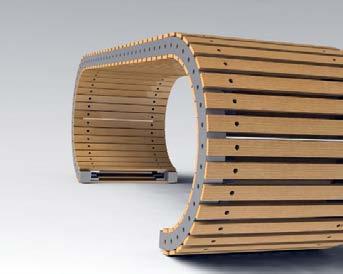
The course aims to encourage candidates to develop:
• an understanding and response to a wide range of play texts, an appreciation of the ways in which playwrights achieve their effects and the ability to communicate the author’s intentions to an audience;
• an awareness of social, historical and cultural contexts and influences through an investigation of plays and other styles of dramatic presentation;
• increased self and group awareness and the ability to appreciate and evaluate the work of others;
• skills of creativity, self-confidence, concentration, self-discipline and communication.
Pupils who are considering taking Drama as an option at GCSE must have a genuine interest in making (exploring, devising, shaping and interpreting), performing (presenting and producing) and responding to (evaluating and applying knowledge and understanding) drama. In order to take Drama GCSE students must have taken the subject during Year 9.
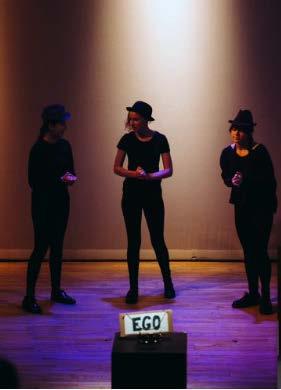
The subject content for GCSE Drama is divided into three components:
1. Understanding drama (written exam)
2. Devising drama (practical and coursework portfolio)
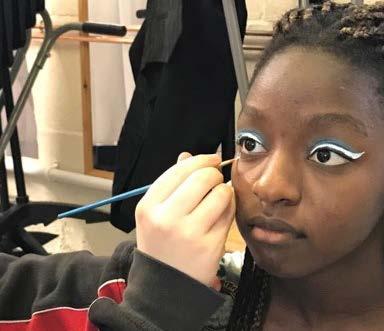
3. Texts in practice (practical)
In the practical components pupils may specialise in performing, lighting, sound, set, costume and/or puppets. Whilst there is a fundamental emphasis on the practical element in this course, the building up of a lively portfolio full of inspirational ideas, collaboration and experimentation and finally evaluation, is also a central part of the course. GCSE Drama allows all pupils to pursue the course in a way consistent with their preferred creative style. This is an exciting course for pupils who have a love of performing arts. We aim to develop creativity, confidence and an analytical skill-set that will benefit pupils across their learning. Pupils will be expected to attend live theatre visits (arranged by the department).
• AO1: Create and develop ideas to communicate meaning for theatrical performance.
• AO2: Apply theatrical skills to realise artistic intentions in live performance.
• AO3: Demonstrate knowledge and understanding of how drama and theatre is developed and performed.
• AO4: Analyse and evaluate their own work and the work of others.
COMPONENT 1: WRITTEN EXAM (40%)
Component 1 consists of the written paper – an open book exam of 1¾ hours.
Section A: multiple choice questions on knowledge and understanding of drama and theatre (4 marks)
Section B: four questions on a given extract from the set play (chosen from a choice of six) (44 marks)
Section C: one two part question (from a choice) on the work of theatre makers in a single live theatre production (32 marks)
COMPONENTS 2 & 3: PRACTICAL WORK (60%)
Component 2 (40%) consists of creating and performing devised drama (pupils may choose to contribute as performer or designer). Pupils will analyse and evaluate their own work with the creation and development of a coursework portfolio (devising log).
Component 3 (20%) consists of a performance of two extracts from one play (this text must be a contrast to the play examined in the written exam). Pupils may choose the text and also may contribute as performer or designer.
Due to the nature of the GCSE course, all students need to understand the basics of the design elements. Some students may like to learn about these in more detail and design options are increasingly popular at GCSE. We are fortunate to be supported by our full time theatre manager who helps with the teaching of these. Students may, instead of or in addition to performing, choose one or two specialism from the following: lighting, sound, set (including props) and costume (including makeup). More information on these is available from Mr Francis.
Please note that regular attendance at Theatre Tech club is compulsory for those wishing to undertake a design path.
EXTRA-CURRICULAR ACTIVITIES:
Regular theatre visits are arranged and pupils are given opportunities to work with professional theatre practitioners (actors, designers, directors) in school. There is a Year 10 production (usually, but not always) of the set text which students are expected to be involved with either as a performer or as a designer.
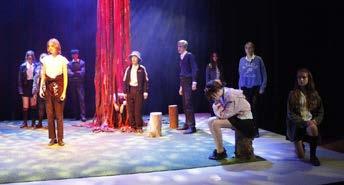
Drama is primarily a subject that is about transferable skills – verbal and non verbal communication, perseverance, collaboration, resilience, creativity, problem solving, focus, giving and receiving constructive feedback, dedication and accountability. It is useful for all A Level subjects.
Depending on what pupils wish to go to study post 18, it can be a useful subject for a variety of combinations including (but not exclusively) English Literature, Politics, Law, Modern Foreign Languages, PE, Music, Art, History, Geography and, obviously, Drama and Theatre.
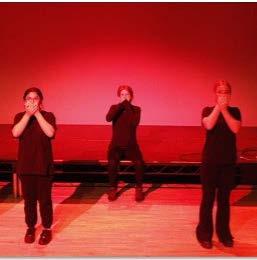
The Geography course divides itself between more traditional Geography associated with physical processes, places and theories that underpin our subject, and an exploration of the contemporary issues and debates that surround our society in the 21st century.

Physical themes include learning about the landscapes and landforms of the UK and understanding how glacial processes 20,000 years ago have shaped our landscape. We will examine whether we can ever fully mitigate against the challenges posed by tectonic and climactic hazards, and explore what influence climate change is having on people across the globe as well as in the UK. Human themes include how development levels across the world are changing and why, an in depth exploration of the opportunities and challenges of economic development in Nigeria and the UK, as well as a study of urban issues in Bristol contrasted to Lagos. We will study the issues of energy and food production in the UK and Europe, and consider what the world of the future will look like.
Due to the wide range of resources used and skills required, Geography is a highly sought after qualification; success in this subject requires an ability to discuss and analyse issues, use high levels of literacy as well as graphical, numerical and statistical skills. Pupils will learn how to carry out independent enquiries, through planning and writing up the findings from their fieldwork. Regular use of the department laptops will be used to support independent enquiry as well as developing essential GIS skills. Critical thinking is encouraged through the evaluation of different issues, with pupils needing to draw reasoned and substantiated conclusions.
Over the past three years, pupils will have learned about a range of Geographical topics, and developed their Geographical skills through their class work, therefore they are prepared for Geography at GCSE. Further, pupils in Year 9 start their GCSE content in January, thus they are already working at a level required for GCSE, and will have some understanding of the rigour this entails. Above all, an interest in the subject and a willingness to work hard are both important criteria for choosing Geography.
Pupils will undertake two pieces of compulsory fieldwork, a river study in the Quantocks and one urban studies day in Bristol, and analyse the data they collect to carry out two geographical enquiries. The processes involved in these, and the skills acquired, will be tested in one of the examination papers.
There will also be an optional trip to Iceland in October half term which will allow pupils to explore some of the topics covered in a more memorable and exotic location, although it should be noted that places on this trip will be limited.
The course has three parts and each has its own examination at the end of Year 11:
UNIT 1: Living with the Physical Environment (35%)
The challenge of natural hazards
Physical landscapes of the UK
The living world
UNIT 2: Challenges of the Human Environment (35%)
Urban issues and challenges
The changing economic world
The challenge of resource management
UNIT 3: Geographical Applications (30%)
This includes an issues evaluation and decision making exercise (with the theme being taken from the two units above) and questions on fieldwork, geographical skills and the two enquiries.
Geography is an A Level subject in its own right but also has many transferable skills. It is arguably the most versatile subject in the curriculum as it can be combined with both Sciences and Humanities. It offers breadth to those requiring it in their range of A Level qualifications.
Geography helps develop a whole range of skills including numeracy, teamwork through regular field trips, analytical skills and a certain technical savviness through using various specialist computing applications. Also, the subject area in itself cultivates a wider world view and increased cultural sensitivity, thus equipping young people with the skills and outlook to tackle further study and to be successful in a workplace.

GCSE History is a popular choice, in part because the content is interesting and thought-provoking. Much of the course’s focus is on the twentieth century, helping pupils to understand the way in which the world of today was created. Current debates in areas like human rights are also highlighted when compared to the persecution of minorities in Nazi Germany. The impact of migration on British society through history, examined in a thematic study, also has great resonance in today’s world.
The course ranges widely across different periods of History. Having studied the First World War, the Inter-War period and the Second World War in Year 9, pupils will examine the narrative of international relations across the rest of the twentieth century. This will include analysing the peace settlements after the First World War, the failure of the League of Nations, the impact of the Great Depression in the 1930s and the causes of the Second World War. The development of the Cold War is also studied, with case studies such as the Berlin Wall Crisis, the Cuban Missile Crisis and the Vietnam War. An in-depth study of Germany between 1925 and 1955 looks at why democracy collapsed in Germany in the early 1930s and how Hitler took power, creating a dictatorship, as well as

the early stages of German recovery after the Second World War.
The course also features a thematic study of impact of migrant populations on British society over a long period of British history, as well as a depth study evaluating the impact of Empire on Britain during the highly significant period of expansion, 1688-c.1730. The GCSE is completed with an exploration of the history of the Spitalfields area of London, as part of the requirement to study historic migration within an urban environment.
All students who have studied History between the ages of 11 and 14 should have the skills and understanding necessary to embark on a course in GCSE History.
The most important elements we are looking for in a GCSE student are interest in the subject and a willingness to work hard. These characteristics should ensure that you enjoy a rewarding course and secure a fine grade at the end of Year 11.
Students will have the opportunity to visit Berlin, a vibrant capital city where the scars of the Cold War are still visible. The city was a symbol of the clash of ideologies so prevalent in the latter half of the twentieth century. It was also the location of so many of the key events that students will study as part of their study of Nazi Germany, giving them an invaluable understanding of their depth study period.
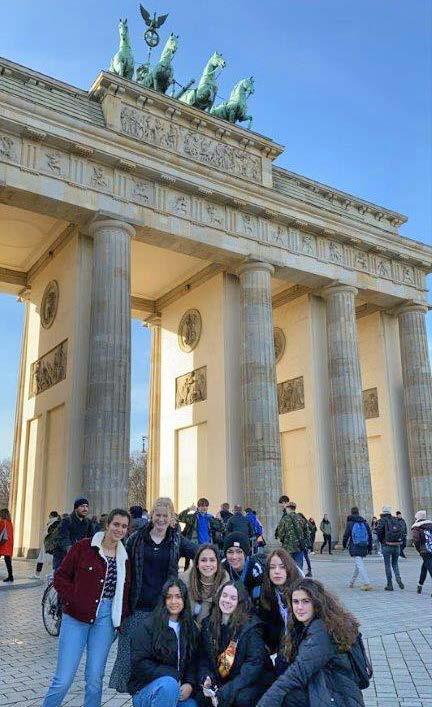
During their studies, students develop an understanding of a range of political and economic vocabulary that is invaluable in today’s environment. They also develop the ability to construct rigorous and well-supported analysis of issues, a skill of value to all. Critical evaluation of source material and other evidence is also a part of the course and enables students to develop their ability to sift and process information effectively in today’s information-heavy world.
The final grade is determined by student performance in the three examination papers.
COMPONENT GROUP 1
International Relations 1918-c.1975 and Germany
1925-1955 (50%)
A written paper (1 hour 45 minutes) involving a range of questions on International Relations 1918-1975 and Germany 1925-1955.
COMPONENT GROUP 2
Migration to Britain c.1000 to c.2010 (25%)
A written paper (1 hour) featuring four questions related to the impact of migration on British Society.
COMPONENT GROUP 3
The Impact of Empire on Britain 1688-c.1730 with Urban Environments: Patterns of Migration (25%)
A written paper (1 hour 15 minutes) with four questions, two of which are based on sources. two will be on the Spitalfields site that the students will be studying.
A GCSE in History is valuable for pupils intending to study History, Economics, Politics, English and all Arts and Humanities subjects at A Level. Moreover, given the communication and evaluative skills it seeks to develop, it is a useful preparation for all prospective Sixth Formers, regardless of what they decide to study.
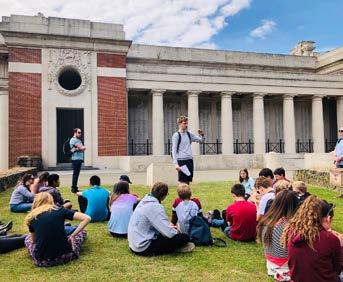
YEAR 10: We continue with the Cambridge Latin Course. Book III is set in the important Roman town of Aquae Sulis (Bath) and the language work is set in the turbulent military occupation of Britain by the Romans. We encounter more complex Latin sentences and complete our learning of Latin grammar.
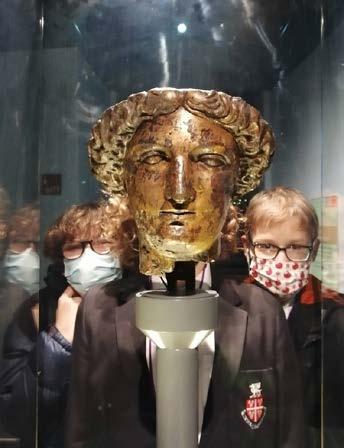
YEAR 11: We turn to the Literature element of the GCSE which involves reading extracts from major Latin authors, material which is often witty, sometimes romantic, occasionally sad, and sometimes rather rude! Students also continue practising their language skills in preparation for sitting the unseen translation paper.
If you have enjoyed your first years of Latin and coped well with it, then there is every reason to carry on to GCSE. An interest in language and a logical mind are obvious advantages. Apart from the inherent value of learning about the language and culture of the Roman world, the benefits to your knowledge of English grammar and spelling will be considerable.
There are three examination papers and no coursework. 50% of the total marks are for language skills and are tested in one 1½ hour paper. Unseen passages of Latin are given for translation and for reading and answering comprehension questions on. A vocabulary list is issued by the Examination Board and we aim to learn this list through the course of Year 11 so that, although no dictionaries are allowed, pupils should be familiar with all of the words on the examination paper.
The other two papers examine the Literature element of the course and together are worth 50% of the total. Pupils sit two papers on the literature selections which we have studied as a class in Year 11. These papers are 1¼ hour and 1 hour long.
Latin provides an excellent base for the study of any modern foreign language. This is obvious in the case of Spanish and French, but Latin is, in common with German, an inflected language, i.e. uses cases. Much of English Literature, especially pre-twentieth century, presupposes some knowledge of the world of Classics. A study of History, Politics and Theology will also greatly benefit from a fairly advanced study of Latin, both in terms of information, and the use of logical thought.
Please contact Mrs Dakin, Miss Evans or Mr Connor if you have more questions about this course.
Mandarin Chinese is the most commonly spoken language in the world, with over 900 million speakers worldwide.
The academic challenge of learning a new, non-Roman script language will stretch all students’ way of learning, way of thinking, and help them to think more deeply about the world around them, including their own culture. Studying Chinese can offer skills and insight for students to be one step ahead in a fast changing environment.
The Mandarin GCSE option is only available to pupils who have studied Mandarin in Year 8 and Year 9. Pupils will acquire the ability to read and respond to articles written in the Chinese language, listen to native speakers and learn to use a range of vocabulary and grammatical structures on a variety of topics. You will also learn the language through strong cultural elements, such as exploring the different Chinese festivals and trying your hand at Chinese calligraphy.
Pupils will learn the language by practising new vocabulary and set phrases through reading, listening, speaking and writing tasks. At this level there is a great emphasis on vocabulary learning, so a commitment to regularly reviewing the work covered in lessons is essential.
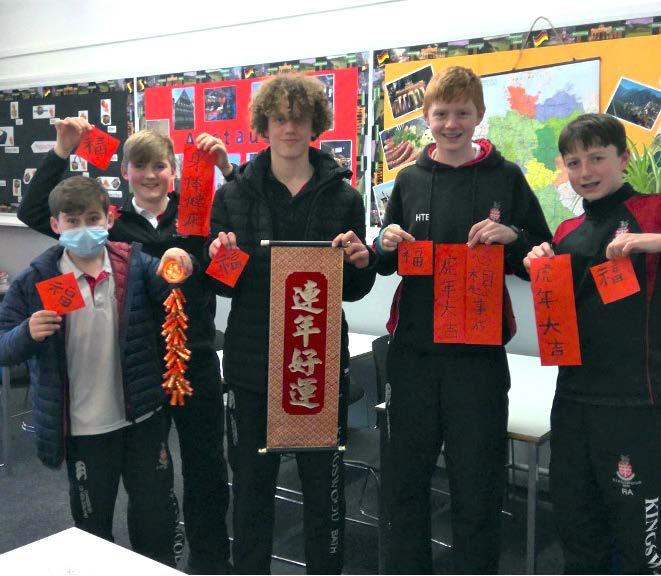
The GCSE course covers three distinct themes. Students are expected to understand and provide information and opinions about these themes relating to their own experiences and those of other people, including people in countries/communities where Chinese is spoken.

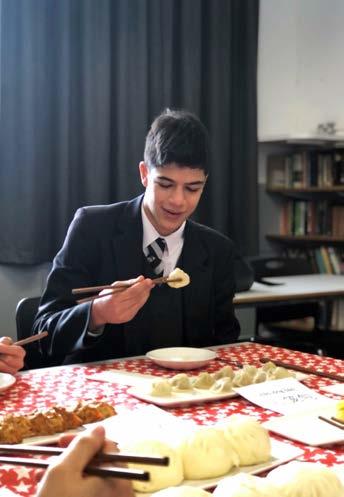
THEME 1: IDENTITY AND CULTURE
• Me, my family and friends
• Technology in everyday life
• Free-time activities
THEME 2: LOCAL, NATIONAL, INTERNATIONAL AND GLOBAL AREAS OF INTEREST
• Home, town, neighbourhood and region
• Social issues
• Global issues
• Travel and tourism
THEME 3: CURRENT AND FUTURE STUDY AND EMPLOYMENT
• My studies
• Life at school/college
• Education post-16
• Jobs, career choices and ambitions
GCSE pupils follow the AQA specification. The GCSE assessment is composed of four papers.
PAPER 1 (LISTENING)
In Paper 1, students will be tested on their ability to understand spoken Chinese.
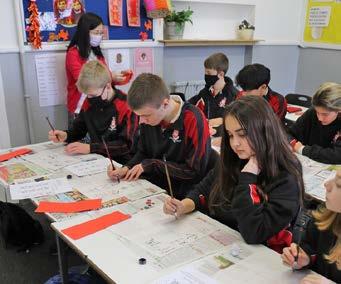
PAPER 2 (SPEAKING)
In Paper 2, students will be tested on their ability to communicate and interact effectively in speech for a variety of purposes.
PAPER 3 (READING)
In Paper 3, students will be tested on their ability to understand written Chinese. The examination consists of a number of short texts, notices or news reports in Chinese which include a range of settings and styles, both formal and informal.
PAPER 4 (WRITING)
In Paper 4, students have to complete two openresponse writing tasks, each linked to a topic area. There is also a question involving translation of four sentences into Chinese.
You will learn to develop an understanding and appreciation of a range of different kinds of music, extending your own interests and increasing your ability to make judgements about musical quality.

You will also acquire further knowledge, skills and understanding needed to:
• make music, both individually and in groups;
• develop a life-long interest in music;
• progress to further study, e.g. A Level and other equivalent qualifications.
You will also learn to develop broader lifeskills and attributes, including critical and creative thinking, aesthetic sensitivity, and emotional and cultural development.
First and foremost, you must have an enthusiasm and love for music and music-making. Whilst the examination board does not expect any prerequisites for starting this course, it is the Music Department’s policy that you should ideally demonstrate an ability on one instrument (including voice) of at least Grade 3/4 standard. You will be expected to understand fundamental concepts and principles of the Theory of Music, equivalent to a minimum level of ABRSM Grade 3, and will work towards Grade 5 theory throughout the course, as needed.
You will spend much of your time performing and composing. 60% of the GCSE is coursework, some of which will be started in Year 10 but the majority of which is completed in Year 11. You will have time during lessons to work on your portfolios, but you will be expected to use a lot of initiative and work independently at home and in the Music School, particularly in Year 11.
There are THREE areas of the course, two of which are coursework modules:
COMPONENT 1: PERFORMING 30%
A portfolio of recordings with a minimum of two pieces, one of which much must be an ensemble performance of at least one minute duration. One of the pieces must link to an Area of Study. Total duration: 4-6 minutes
COMPONENT 2: COMPOSING 30%
A portfolio of two compositions, one of which must be in response to a brief set by the exam board which will link to the Areas of Study and is released in the September of Year 11. The second composition is a free composition.
COMPONENT 3: APPRAISING 40%
A listening and written paper of 1 hour 15mins. This will test listening skills and understanding of the context of pieces of music, based on the Areas of Study. In addition to listening to a wide range of Popular, Classical and Film Music, students are also required to study two pieces in greater depth: JS Bach Badinerie and Africa by Toto.
GCSE Music is required in order to advance onto A Level Music. Beyond that, an ability to work independently towards deadlines (e.g. concerts, recording sessions) through self-disciplined practice and creative thought will be useful for all A Level subjects. Other skills that will be acquired and developed will include presentational skills, an ability to work in a variety of settings, an ability to reflect objectively on one’s personal work, and an ability to solve problems through imagination and logic.
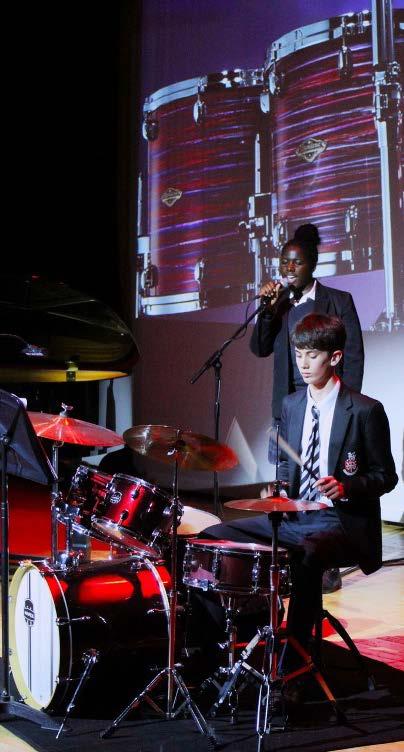

All students will learn about a range of issues relating to Physical Education and Games.
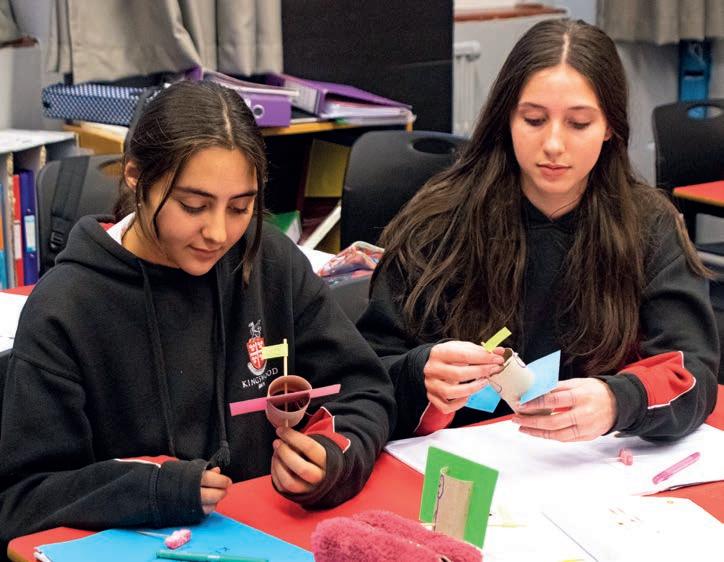
They will develop their skills and understanding through selected practical activities as well as developing their theoretical knowledge of factors that affect participation and performance. Rules, etiquette and convention will also be developed along with a promotion of the health benefits and risks associated with taking part in physical activity. Students will also develop the skills to analyse and improve their own and others’ performance.
No specific knowledge is required but an interest in sport is essential if a good grade is to be achieved. Strong practical ability in a variety of sports is also advantageous with 40% of the course being based on practical assessment in three separate activities. The theory element has been extended for courses starting in 2016 and beyond, but the demands are well within the capability of our students, and a better preparation for those hoping to continue on to A Level.
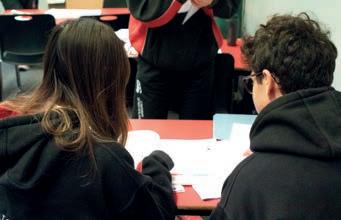
The coursework element requires pupils to demonstrate practical ability in three different activities: one in a team sport, one in an individual activity and the third from either sphere. There is also a requirement to identify practical weaknesses in one of their chosen sports and indicate ways in which to improve those aspects of the activity.
Practical assessments make up 40% of the overall grade. Students are required to show their ability, understanding and input in three activities chosen from at least two different practical areas.
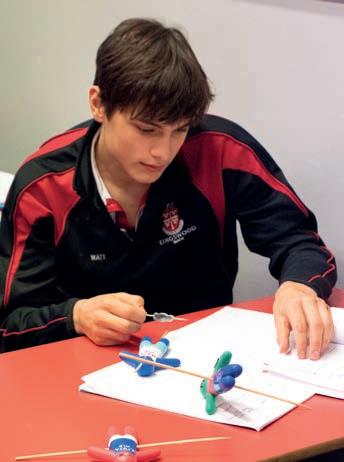
There are two written papers of 1 hour 15 minutes each, worth 30% at the end of the two year course.
Paper 1 is on ‘The Human Body and Movement in Physical Activity and Sport’ which includes applied anatomy and physiology, movement analysis, physical training and use of data.
Paper 2 is on ‘Socio-cultural Influences and well-being in Physical Activity and Sport’. This includes sports psychology, socio-cultural influences and health, fitness and well-being.
Physical Education can help with a number of A Levels but especially the Physical Education A Level. The physiology included also provides a good foundation for Biology.
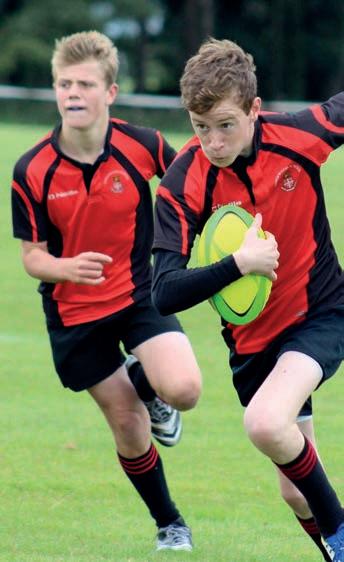
There are two parts to the IGCSE. Part I focuses on Beliefs and Values and Part II on The Buddhist Community.
By studying a wide range of topics, students will come to understand and appreciate the vital role and function that religion, philosophy and ethics plays in today’s world.
PART I: Beliefs and Values
(60% of the IGCSE)
Sub-topics include: Belief and Unbelief; Destiny, Purpose and the Meaning of Life; Free-will and Determinism; Life after Death; The Universe and the place of humans within it; Human Nature and the Human Condition; Evil and Suffering; Equality and Human Rights; Racial and Inter-faith Harmony; RichPoor Relations; Marriage, Divorce and Family Life; War & Conflict; Crime & Punishment.
PART II: The Buddhist Community (40% of the IGCSE)
Sub-topics include: The Origins of Buddhism and the Impact on the Community; Religious Texts and Sources of Authority; Buddhist Celebration and Pilgrimage; Buddhist Worship and Practice.
RPE is an optional subject for students. The newly reformed IGCSE course is designed to encourage an open-minded and critically objective investigation into the studies of religion, philosophy and ethics.
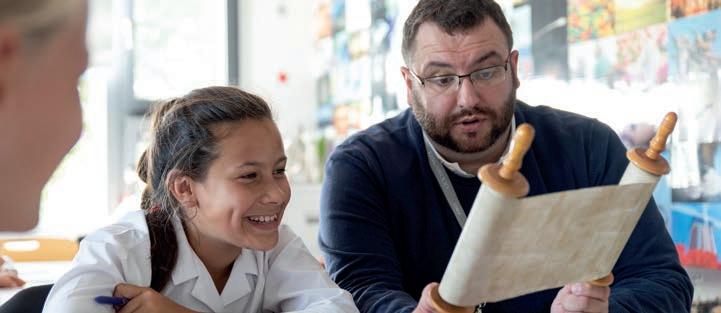
Year 10 – Beliefs and Values / The Buddhist Community
Beliefs and Values: The Universe, Creation and the Place of Human Beings; Matters of Life and Death.
The Buddhist Community: Origins, Founders and Leaders; Celebration and Pilgrimage.

Year 11 – Beliefs and Values / The Buddhist Community
Beliefs and Values: Peace & Conflict; Rights, Equality & Social Justice.
The Buddhist Community: Buddhist Worship & Practice.
Pupils will sit two examination papers, one for each part of the IGCSE. Part I is assessed through a single 1¾ hour paper and Part II through a single 1½ hour paper. Both papers are sat in the Summer Term of Year 11.
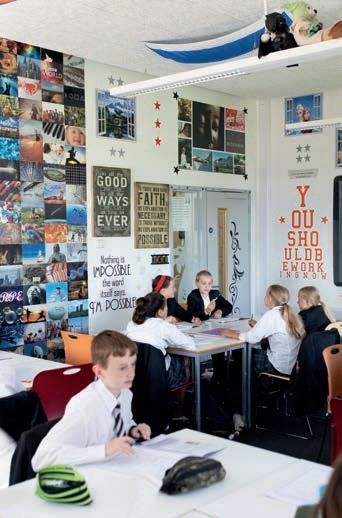
Transferable skills, such as the high level of analysis required in explanatory and evaluative questions, are particularly useful for subjects such as English, History, Politics, Geography, Biology and Economics. There are also strong curricular links with Theatre Studies, Art and Music.

www.kingswood.bath.sch.uk